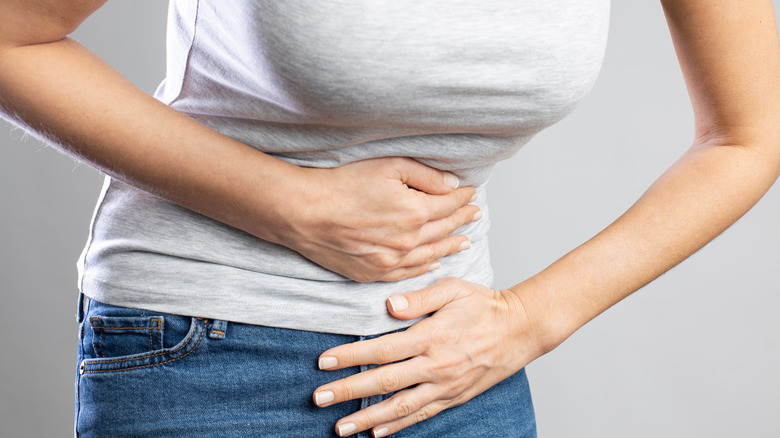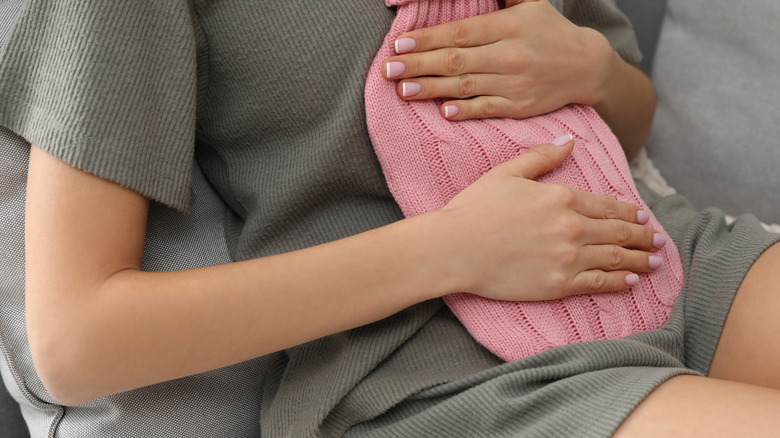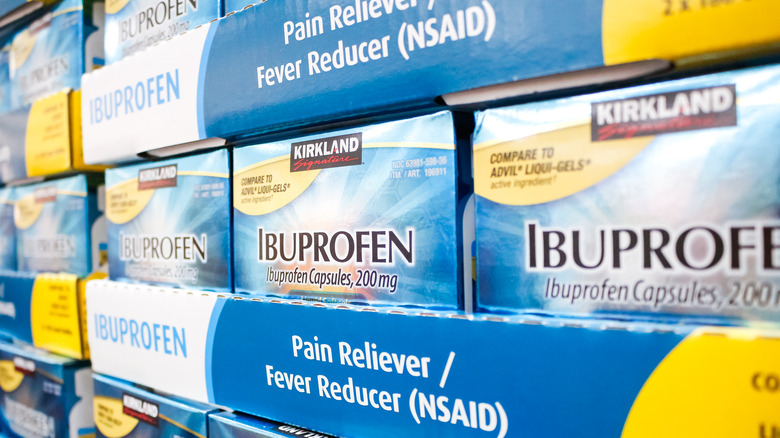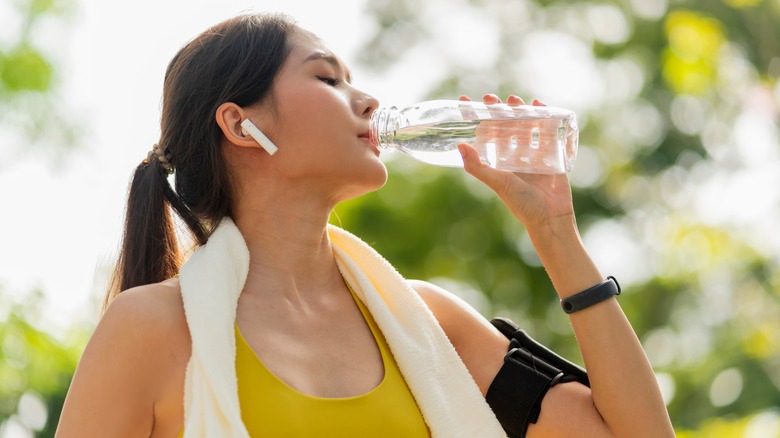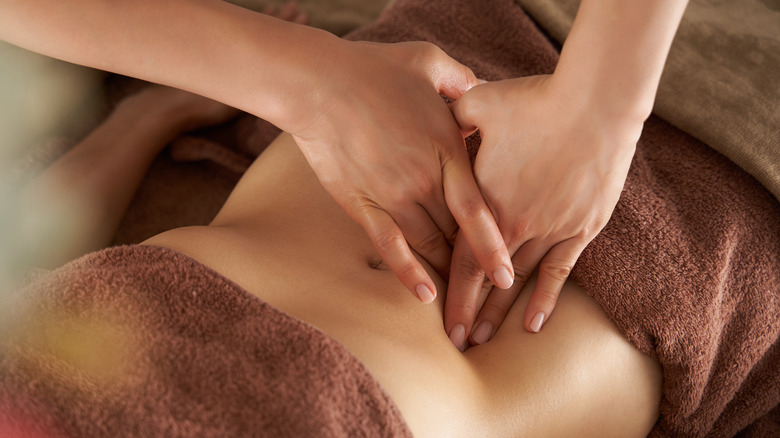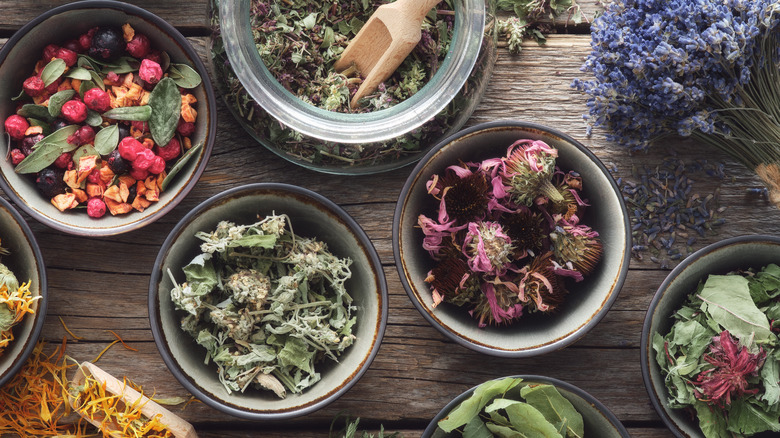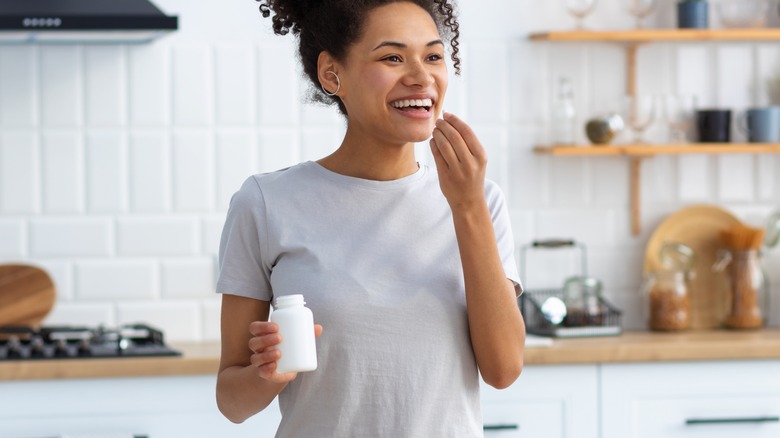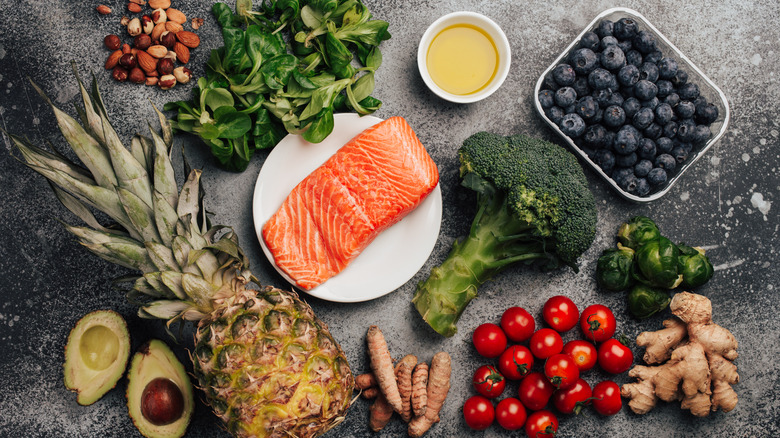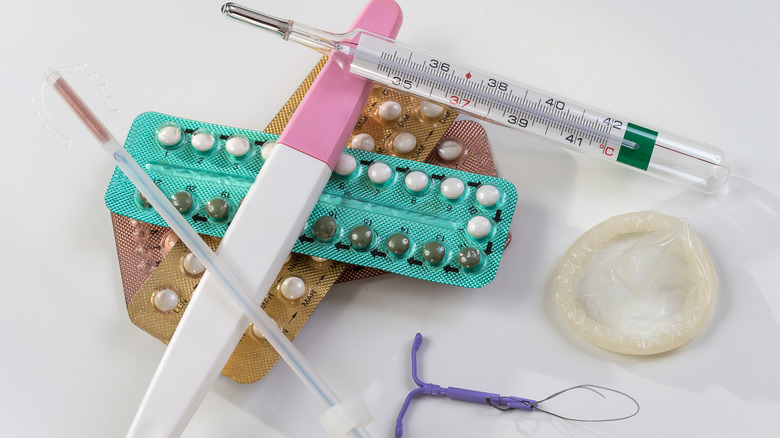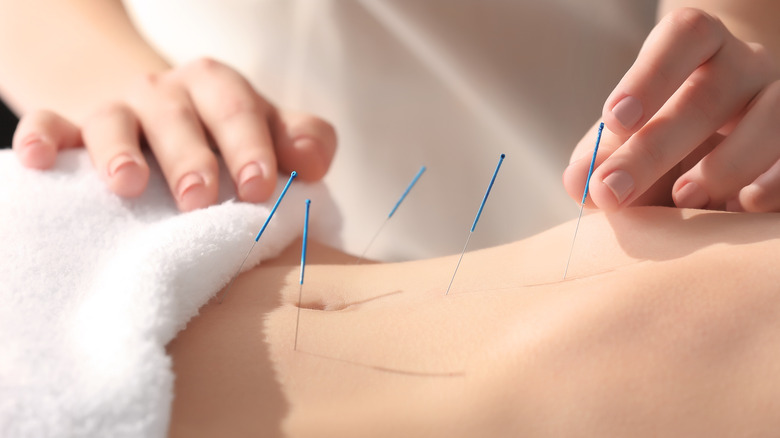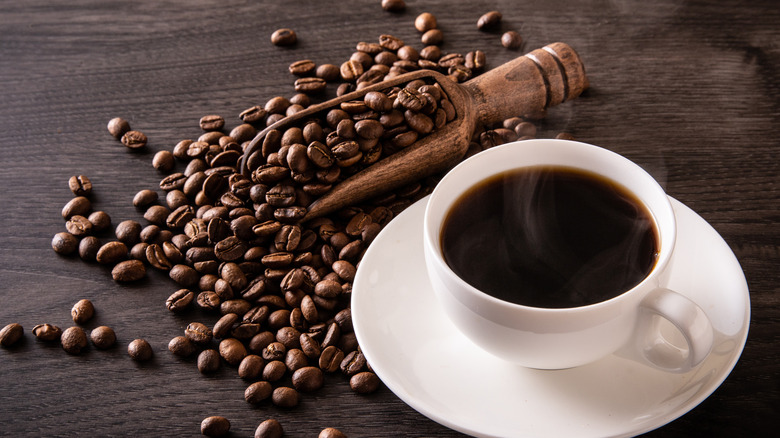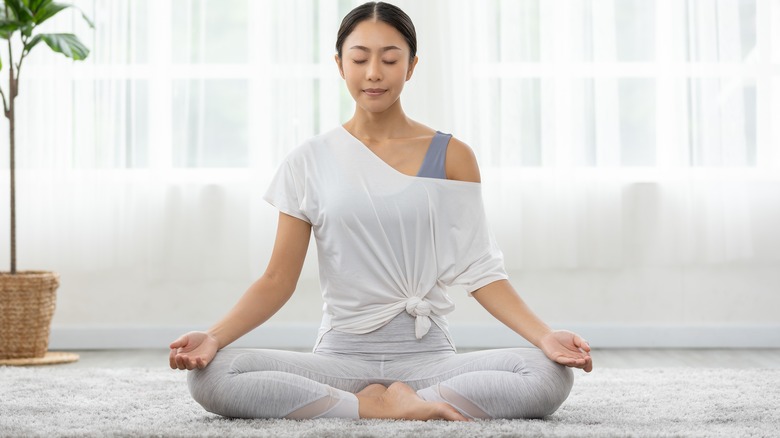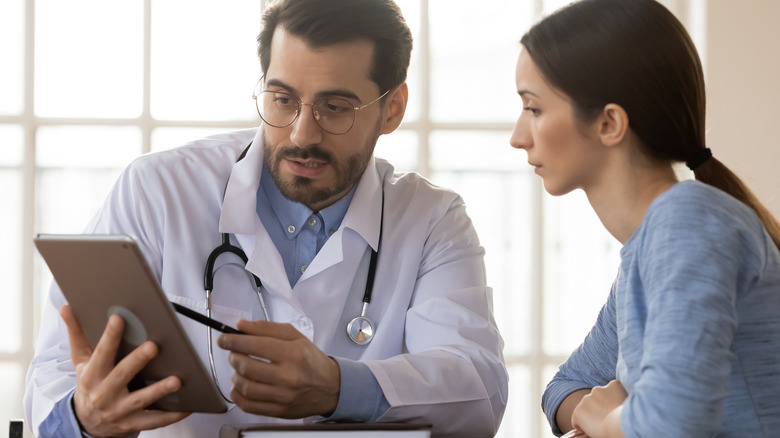Tips For Dealing With Painful Menstrual Cramps
Dealing with painful menstrual cramps every month can be frustrating. Those aching, throbbing cramps that come just before or during your period can range from mildly uncomfortable to severely painful (via WebMD). Painful menstrual cramps — or dysmenorrhea, as your doctor may refer to them — can involve pressure or pain in your belly, hips, or lower back. They can also be associated with stomach issues like diarrhea, nausea, or vomiting.
What causes these painful cramps? Each month during your period, your uterus contracts. When it contracts too strongly, it can press against your neighboring blood vessels, resulting in painful cramps when the muscle tissue in your uterus ceases to get its oxygen supply (per the Cleveland Clinic). For some women, these menstrual cramps can happen each month; this is called primary dysmenorrhea. The pain typically starts about one to two days prior to your period, or when you begin to bleed.
If period pain is a common part of your menstrual cycle, know that there are a variety of ways you can deal with those painful menstrual cramps and find relief.
Try applying heat
If you're looking for a fast fix to relieve your painful menstrual cramps, then applying heat may do the trick.
One study found that heat therapy was an effective way to treat menstrual cramps (via Scientific Reports). Another study published in the British Medical Journal found that placing a heating pad on your stomach can be just as effective as taking ibuprofen when it came to handling pain from dysmenorrhoea. The study also found that women who used heat along with ibuprofen experienced greater pain relief than those who only applied heat.
The secret to making this an effective treatment for menstrual cramps is to keep the heat on the area that causes you pain for as long as possible (via Intermountain Health Care). If you can't apply a heating pad continuously throughout the day, then you can try using other methods, such as a hot water bottle, taking a bath in warm water, or using a heat patch.
Take an over-the-counter pain reliever
You may find relief from painful cramps by taking an over-the-counter (OTC) pain reliever (via the Mayo Clinic). To help control the pain, you can start taking a pain reliever the day you expect your period to start, or as soon as you feel the symptoms begin to arise. It's also advised that you continue to take the recommended dose during the first few days of your period to help keep symptoms at bay.
But which OTC medications should you take for menstrual cramps? According to Goodrx, there are a few that will help relieve your symptoms. Ibuprofen, which you may know as Advil or Motrin, is an anti-inflammatory medication that can help stop the production of prostaglandins, which is what causes your cramps. The recommended dose is 200 milligrams to 400 milligrams every 4 to 6 hours. Another anti-inflammatory medication you can try is naproxen, which you may know as Aleve. This works pretty much the same way as ibuprofen, except the dosage is different. Doctors only recommended 220 milligrams every 8 to 12 hours.
Another pain reliever is acetaminophen (Tylenol). This is not an anti-inflammatory medication; it works by blocking chemicals in the brain that cause pain. A typical dose of this pain reliever is 650 milligrams every 4 to 6 hours. In addition to these three OTC treatments, you can also try Midol or Pamprin to help relieve symptoms.
Decrease your stress
Stress has been known to manifest in your body in many ways, but did you know that it can also lead to more painful periods? When you're stressed, the hormone cortisol can interact with other hormones at different phases of your menstrual cycle (per Goodrx). When these hormonal changes occur, they can adversely affect your menstrual cycle, causing you pain.
For example, one study in the Saudi Journal for Health Sciences examined how high levels of stress affected college-age women's menstrual cycle. They found that higher levels of stress were associated with more painful periods. Another study found an association between women feeling stressed earlier in their cycle and the severity of their premenstrual symptoms (per National Institutes of Health). The findings revealed that women were up to four times more likely to have severe menstrual symptoms when they were stressed, compared to when they did not feel stress.
Learning to manage your daily stress can help you manage your period pain. According to the Cleveland Clinic, you can decrease stress by getting regular exercise, eating healthy, avoiding caffeine and nicotine, and practicing relaxation techniques like yoga, meditation, and mindfulness.
Get regular exercise
One of the last things you probably want to do when you're doubled over in pain from menstrual cramps is to exercise. However, according to Healthline, exercises such as walking may help combat those painful periods.
Many doctors agree that exercise can help reduce period pain. Dr. Gustavo Rossi, an obstetrician at Virginia Hospital Center in Arlington, told WebMD that the reason exercise can help to ease cramps is because when you exercise, your body releases beta-endorphins, which acts as its natural pain reliever. If you feel like your period cramps are slowing you down each month, try incorporating a regular exercise regime into your daily schedule. A review found that regular exercise (three times a week or more) can significantly reduce your menstrual cramp pain (per Cochrane Library).
Some of the best types of exercise to combat period cramps include walking, swimming, yoga, pilates, aerobics, and strength training (via Goodrx). You can adjust your workout based on how you feel.
Try an essential oil massage
People have been using essential oils for centuries, but can they help relieve your menstrual cramps? According to one review in the Journal of Clinical Medicine, essential oils can indeed help manage pain when it comes to that time of the month.
If you're wondering what kind of essential oils work best, one study found that the mixture of lavender oil, sage oil, and rose oil in almond oil can help reduce menstrual cramps when massaged on your abdomen (via The Journal of Alternative and Complementary Medicine). Another study found that mixing the essential oils of cinnamon, clove, rose, and lavender in a base of almond oil can also reduce menstrual pain as well as heavy periods (via Evidence-Based Complementary and Alternative Medicine).
If you'd like to try massaging essential oils on yourself at home, Healthline suggests adding a few drops of your essential oil of choice to a carrier oil (such as coconut, avocado, almond, or extra-virgin olive oil). This will make it easier to apply on your abdomen. Do this once a day for about a week before your period begins, in order to feel the best results.
Have an orgasm
The idea of having an orgasm while on your period may sound like a huge no-no to some women, but would you do it if could help soothe your painful period cramps?
Dr. Maureen Whelihan, an obstetrician, and gynecologist, told Woman's Health that orgasms help release oxytocin and dopamine, which are "feel-good" chemicals. As you orgasm, the blood rushes to your uterus, helping to reduce cramps. If having sex on your period doesn't sound inviting to you, masturbation will have the same effect, according to another Women's Health article.
If a doctor's opinion doesn't convince you, then maybe some research will. A study sponsored by the sex toy brand Womanizer and the menstrual cup brand Lunette found that regular masturbation was an effective way to reduce menstrual cramps. A staggering 90% of participants said they would recommend solo play as a way to alleviate period pain. So, if you're on the fence about trying to orgasm with your partner to relieve your period pain, then perhaps you should consider a little self-help.
Add herbs to your diet
If you aren't finding relief from over-the-counter medications or placing a heating pad on your belly, then you may consider giving herbal remedies a try.
Herbal remedies have been used to treat menstrual cramps for some time now, and have shown promising results. A study in the Iranian Journal of Pharmaceutical Research looked at the effects that the herb lemon balm had on period pain, and found that it helped to reduce the severity of symptoms that are associated with painful periods. Another study published in The BMC Complimentary and Therapies found that ginger can be an effective treatment for menstrual cramps. Since ginger has anti-inflammatory properties, it acts as a pain reliever reducing PMS symptoms such as cramps.
Chamomile tea is another herbal remedy that has promising results for relief from period pain. A review published in the Molecular Medicine Report found that chamomile can help reduce muscle spasms as well as menstrual disorders. The next time you're in agony from period pain, try one of these herbal teas to get some relief.
Try dietary supplements
If painful menstrual cramps are preventing you from functioning at your highest potential, then you should consider trying a dietary supplement.
A review in the Cochrane Library found that supplements such as fish oil, zinc, vitamin B1, and vitamin E may help in relieving the pain of period cramps. Experts in one study found that fish oil is a better treatment than ibuprofen when it comes to relieving severe period pain (via Caspian Journal of Internal Medicine).
Magnesium is another dietary supplement that may reduce painful periods, says a review in Magnesium Research. Just a 300-milligram dose of magnesium can be an effective way to reduce the severity of menstrual cramps, suggests a study published in the International Journal of Women's Health and Reproduction Sciences. Remember, some supplements may interact with other medications you are taking, so be sure to contact your doctor before adding anything new to your daily regime.
Eat more anti-inflammatory foods
If you eat highly inflammatory foods, chances are you are going to add to your discomfort around the time of your period.
A study published in BMC Woman's Health found that college students who ate more highly processed or high-sugar snacks had an increased risk of painful periods. During menstruation, prostaglandins make your uterus contract as well as increase inflammation (via the Mayo Clinic). Because of this increase in inflammation, many doctors recommend an anti-inflammatory diet (per Insider). According to the Physicians Committee for Responsible Medicine, eating foods such as fruits, vegetables, and whole grains can help decrease both the inflammation in your body and menstrual pain.
You may also want to consider eating a plant-based or vegetarian diet, because that will also help quell inflammation in the body. The reason these types of foods fight inflammation is due to the high levels of antioxidants and plant chemicals that are in them. When ingested, these substances can help your body to function at its best.
Consider birth control
If regular exercise and eating a healthy diet don't help make your painful cramps disappear, then you may want to consider contacting your doctor to prescribe hormonal birth control.
Birth control helps to ease cramps by lowering the production of the chemicals that your body produces to make your uterus contract, which then reduces cramping (via Kids Health). A study in Obstetrics & Gynecology found that women who took birth control, whether it was constant or cyclically, experienced less painful periods.
It's important to note that when you start birth control, it can take time for your hormones to adjust, so you may feel some normal PMS symptoms. Also, if you fail to follow your medication schedule or forget to take your pill, you may experience menstrual symptoms like cramping (via Medical News Today). For the most part, though, doctors will recommend birth control, because it can help to reduce painful cramps. If you have severe symptoms with your current birth control, speak with your doctor about recommending an alternative brand of birth control.
Try acupuncture
An alternative treatment for painful menstrual cramps is acupuncture. This is where thin needles are inserted into strategic points of your skin on your body and left there for up to 30 minutes (via Women's Health).
The way it works in relieving your discomfort is that the process of inserting the needles into the skin "increases blood flow to the uterus, which can relax the muscles similarly to a hot pad and reduce uterine contractions," per Dr. Lisa M. Bartoli of the American Academy of Physical Medicine and Rehabilitation (via Woman's Health).
Interestingly, a meta-analysis of studies found that acupuncture was more effective than taking anti-inflammatory drugs (NSAIDs) at addressing menstrual pain. Another study in the Journal of Acupuncture and Meridian Studies set out to examine the effectiveness of acupuncture on primary dysmenorrhea, and found it to be an effective treatment for managing period cramps. If you're interested in trying something out-of-the-box, this may be an effective treatment for you.
Cut back on caffeine
If you consume a lot of caffeine and find that you are having painful periods, then you may want to consider cutting back on your caffeine intake around the time of your period, says endocrinologist Dr. Rocio Salas-Whalen (per Insider). If you're consuming a lot of caffeine (3 or more cups a day) before and during your period, you may be making your cramps worse, because the caffeine causes your blood vessels to narrow. If you think you can't live without coffee, consider switching to decaf during your period, or try taking a quick walk to raise your energy levels (via Health Partners).
However, not all experts agree that caffeine can make your period pain worse. One study in the American Journal of Clinical Nutrition found that caffeine was not associated with painful period symptoms. Researchers suggested that reducing your caffeine intake may not help you avoid symptoms related to your period.
In the end, it's up to you to see if your menstrual cramps are related to your caffeine intake. Try keeping a food diary to see if it's necessary to cut down on caffeine during your period.
Practice yoga
If you're experiencing period cramps, then practicing yoga may be your lifeline.
A study published in the Journal of Alternative and Complementary Medicine found that practicing yoga may help reduce menstrual cramps. Colleen Boland, a yoga teacher based in California, told the Yoga Journal that practicing yoga, specifically through your pelvic region "can help ease cramping in that area." Boland says that these pelvic movements help to stimulate the blood flow, which can help reduce cramps. She suggests trying the Knees-to-Chest Pose (Apanasana), in which you lie down on your back and pull your knees to your chest. This is a great movement for the beginning of your period, or when it feels intense because you're not really moving much, but still getting relief.
Another pose to try is the Child's Pose (Balasana). This is another pose that doesn't require active movement, but still gives you relief. To get into this pose, sit on your knees then lean forward, then place your forehead and hands out in front of you.
When to see the doctor
If your menstrual cramps are so severe that they're disrupting your life, then it may be time to see your doctor (via Healthgrades).
While many women experience period pain, some women may be sensitive to or may create more prostaglandins, which are the chemicals in your body that make your uterus contract and give you cramps. There are also some risk factors you should look out for that may make you more prone to period pain, such as starting your period either early or late, just starting menstruation, being obese, smoking, never having a baby, or having a family history of painful cramps. Menstrual cramps can also be caused by other factors, such as endometriosis, uterine fibroids, ovarian cysts, pregnancy problems, or several other reasons.
If you've tried everything to treat your symptoms at home and you're still in pain, and if you experience other signs (such as heavier periods or cramps for over two months, period pain that doesn't get better with medication, or a fever along with your cramps), then it's time to contact your doctor.

